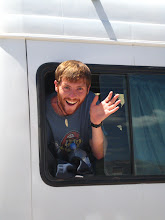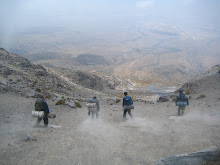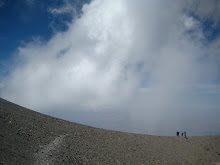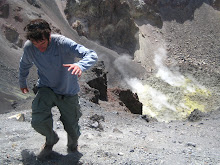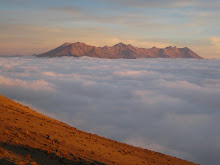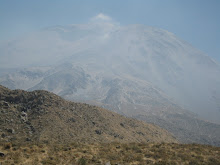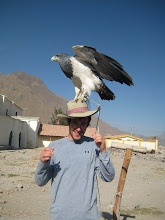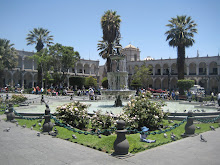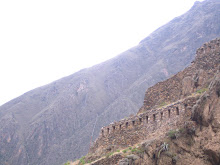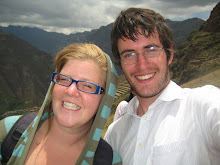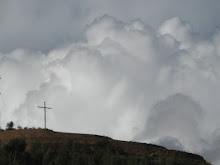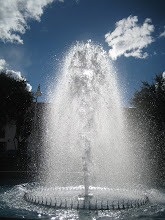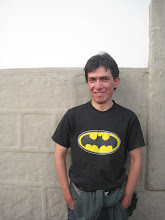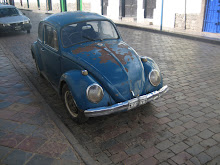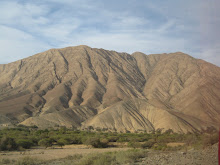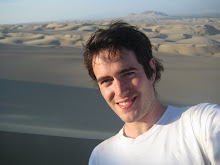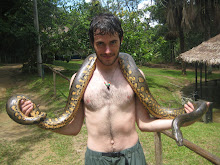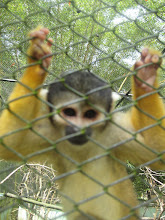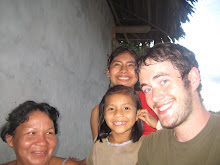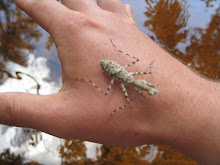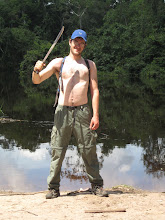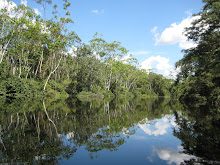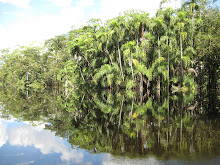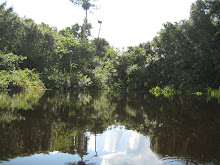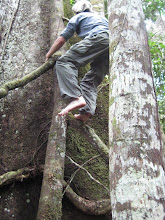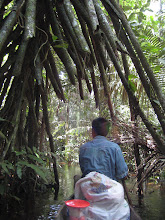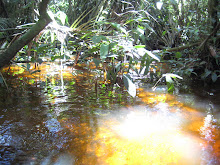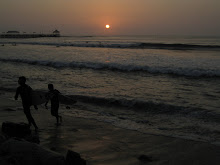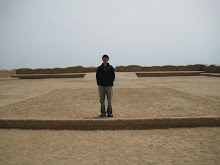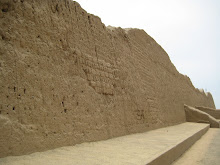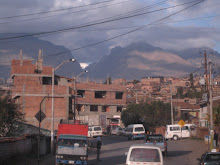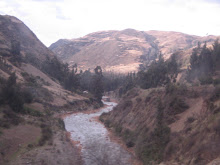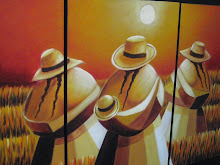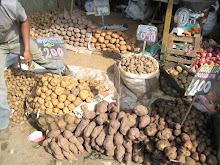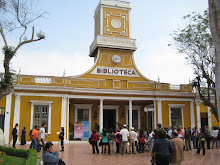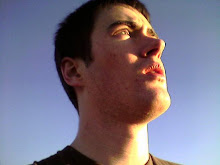That's right folks. As of now I do not exist. I believe, however, that I am a very blessed man. Allow me to explain!
I got an email from my sister the other day telling me that "Bolivia found my stuff. Call mom and dad." So I Skyped them, and learned that they had gotten a call from the US Embassy in Bolivia saying that someone had walked into the US Embassy with my missing money bag; containing money as well as my passport, credit cards, ID and other documentation. Upon visiting the embassy, I discovered that a local woman had traveled 12 hours each way to drop my stuff off at the embassy. It's amazing how people prove you wrong. In an earlier blog post I'd been talking about my impressions about Bolivians being unfriendly. I'm learning more and more that in whatever situation people are in, they have the capacity for both good and bad. And most people try to be good.
Anyways, I also learned that I no longer existed. Before I left for my tour of the salt flats on the 14th, I got a Bolivian exit stamp for the 16th for when I was sure to cross into Chile. Not having been able to do so, I left one country and didn't enter another. I'm now no longer allowed to leave Bolivia since I technically haven't entered it. Following me so far? So the US Embassy in Bolivia has arranged to sneak me across the border into Peru tomorrow so that I can come back into Bolivia and get an entry stamp to then leave Bolivia and go into Chile. That should be fun. :)
Due to the general delay in my plans, I'm now planning on spending Christmas in Bolivia - hopefully in the town of Sucre with some Canadian traveling friends. I may also visit the mining town of Potosi beforehand. Afterwards, I'll be very excited to finally be able to cross into Chile.
Regarding this whole passport situation, the lady at the US Embassy told me that I was one in a million. I know that there were a lot of people praying for me back home, and I feel tremendously blessed to have so many friends that care about me, and to have God watching over me on this trip.
Oh, and regarding Uyuni, I figure I might as well share some pictures with all of you now, right?
Cheers, God Bless,
Stephen
Friday, December 19, 2008
Wednesday, December 17, 2008
Losing Things, But Not Faith
Hello everyone,
Well I set off towards the salt flats of Bolivia with the intention of moving on from there to San Pedro De Atacama, Chile. Along the way, however, I´d somehow manage to lose my money belt containing my passport and credit card (among other things). This would have me traveling back across the country to La Paz to run errands - certainly wasn´t the plan, but I´m dealing with it.
There was a time after the tour of the salt flats where I was sitting in the tour agency office, waiting on a radio communication to see if my money belt had been found. I told the agency manager that I had esperanza (hope), and his response was pretty profound. He said that this was good, because the last thing that I should lose is fe (faith) Nobody would find my money belt, but I´d remember what this man said.
I´m not sure why I´m still here in Bolivia, but I believe that I´m in God´s hands. Who knows, maybe I needed a bump in the road. I´m very thankful for the help that I´ve already received from my family and friends, and will try to keep you all updated on how things are going.
I´ll put up some pictures of the salt flats on my facebook and also here when I get the chance. I think, as the saying goes, that they´ll be worth more than the thousands of words I could have written about them.
God bless,
Stephen
Well I set off towards the salt flats of Bolivia with the intention of moving on from there to San Pedro De Atacama, Chile. Along the way, however, I´d somehow manage to lose my money belt containing my passport and credit card (among other things). This would have me traveling back across the country to La Paz to run errands - certainly wasn´t the plan, but I´m dealing with it.
There was a time after the tour of the salt flats where I was sitting in the tour agency office, waiting on a radio communication to see if my money belt had been found. I told the agency manager that I had esperanza (hope), and his response was pretty profound. He said that this was good, because the last thing that I should lose is fe (faith) Nobody would find my money belt, but I´d remember what this man said.
I´m not sure why I´m still here in Bolivia, but I believe that I´m in God´s hands. Who knows, maybe I needed a bump in the road. I´m very thankful for the help that I´ve already received from my family and friends, and will try to keep you all updated on how things are going.
I´ll put up some pictures of the salt flats on my facebook and also here when I get the chance. I think, as the saying goes, that they´ll be worth more than the thousands of words I could have written about them.
God bless,
Stephen
Thursday, December 11, 2008
Joining the Parade and Going to Prison
Hola todos!
Gosh it's been a while, hasn't it? Well, I've actually been in La Paz, Bolivia this whole time. I've had ups and downs in terms of both my enthusiasm while being here, and the intensity of my experiences. As far as the latter goes, I'll save the most intense for last.
I was definitely sad to leave Peru. I'd met some truly heartwarming people there, and had some incredible experiences. I couldn't help feeling a bit singled out at the Bolivian border, as I was the only one on my whole bus full of people that needed to apply for a Visa to enter the country. "Algun de los Estados Unidos?" they asked, "Anyone from the United States?" But I'd already been talked into it by my friends - some travellers, and some at home. And after a brief stop-over in the unimpressive Copacabana, we came onto the hill looking down into La Paz - an incredible panorama which I was disappointed our bus driver wouldn't stop for us to take pictures of. Built into a canyon, an astonishing mess of buildings fill the center and then climb up the canyon on both sides. Until they really do succeed in freeing Tibet, La Paz is the highest capital city in the world.
My first impression walking the bustling streets was that people might not be as friendly in Bolivia as in Peru. People often wouldn't respond to me when I tried to greet them walking by, and there weren't any groups of high school girls running up to me to ask me to take pictures with them. But as someone pointed out to me big cities can serve to rob people of some of their charm. I think if the only South American city I'd seen before this one had been Lima, I wouldn't have had much of a reaction. And of course, maybe the people are just different. Still, I was finding it a bit difficult to make friends in the local community.Gosh it's been a while, hasn't it? Well, I've actually been in La Paz, Bolivia this whole time. I've had ups and downs in terms of both my enthusiasm while being here, and the intensity of my experiences. As far as the latter goes, I'll save the most intense for last.
I was definitely sad to leave Peru. I'd met some truly heartwarming people there, and had some incredible experiences. I couldn't help feeling a bit singled out at the Bolivian border, as I was the only one on my whole bus full of people that needed to apply for a Visa to enter the country. "Algun de los Estados Unidos?" they asked, "Anyone from the United States?" But I'd already been talked into it by my friends - some travellers, and some at home. And after a brief stop-over in the unimpressive Copacabana, we came onto the hill looking down into La Paz - an incredible panorama which I was disappointed our bus driver wouldn't stop for us to take pictures of. Built into a canyon, an astonishing mess of buildings fill the center and then climb up the canyon on both sides. Until they really do succeed in freeing Tibet, La Paz is the highest capital city in the world.
My first success was amusing really. I was in an internet cafe, and saw a Bolivian guy playing a video game called Defense of the Ancients that I used to play. I started talking to him, and he said that him and a bunch of other guys would be playing that night and that I should come back. I did, and we ended up playing this game til 2 in the morning!
The weekend approached, however, and my new gamer pals wouldn't be playing games, so I tried another avenue of meeting the locals. A traveller friend of mine has been trying to get me to try Couchsurfing - a worldwide networking site where travellers "surf couches" as is the premise, and locals offer them up because they want to meet people from different cultures, or introduce them to their own. Often this takes the form of just meeting up, rather than the hosting of a couch. I sent out some messages to some La Paz locals, and it wasn't long before I got a response. This Bolivian woman, named Flavia, was planning on going to a local rock concert Friday night with a couple other foreigners, and invited me to come. We stopped for dinner together, and then afterwards made our way to the concert. Along the way, however, we lost a girl from Britain named Anna after she stopped to use her phone, and then mistakenly ran after us in the wrong direction. Flavia was a bit worried about her since it was dark and she didn't know her way around the city. So Flavia went and got a couple nearby police officers and we looked for Anna. When we finally did find her, she was upset because some guy had stolen her phone. We walked around the area with the police officers looking for the culprit, but to no avail. We went to the concert anyways and tried to put the whole incident behind us. At the concert, I met some of Flavia's friends, and we had a great time dancing together to the La Paz band "Atajo" who were fairly decent. Really though, it was nice just to be with some Bolivians doing something Bolivian - even if it had been a bit of a crazy night.
The next cultural experience began on a different day when I heard the sounds of a parade in the distance and felt compelled to follow them. I came upon the group of musicians and costumed dancers during their break, and asked them what the parade was about. I worked out that it was a celebration for Saint Barbara. Good enough for me. Being someone that enjoys a good bit of music and dancing, I asked them if I could join in when they continued. They were very enthusiastic, and paired me up with a large, older Bolivian woman in a bowler hat. The next thing I knew, I was dancing down the street arm in arm with two older Bolivian women in bowler hats in the center of a parade with a full brass band behind us! A few onlookers seemed surprised to see a white guy smack dab in the middle of the whole thing, but we marched onwards. Down one street, down another, all through town. We'd stop every now and then for some food and drink, which they graciously insisted I partake of. This was entertaining for a while, until I realized I didn't really know when this parade would end, and was supposed to meet some friends from Canada who were coming into town that afternoon. And here I was locked arms with these enthusiastic women in bowler hats. Finally we stopped to take a break inside a courtyard, but I was still pinned in, and they insisted I eat more food even though I was starting to get pretty stuffed. What was worse, a group of these women in bowler hats started hitting on me shamelessly! After one of them asked me if I had a woman back in the States, and I answered honestly that I did not, they each started making cases for why I should take them as a wife. I said that I was travelling right now, and just didn't think it would work out, but they continued until we started marching again. Further down the road, we stopped again, and I said that I needed to go. Finally, my dancing partner let me go. She stopped for a second and said "Que triste, eh?" in a sad sort of way. After walking away I'd feel bad. In such a short time they'd completely opened their culture and their hearts to me, and all I could think about was getting away. Such is the way of the traveler sometimes, I suppose.
I wouldn't have any more such experiences for a while, as my two Canadian friends had arrived, and I'd spend a couple days hanging around the city with them. Another group of my friends who I'd met travelling in Peru arrived subsequently, and so I'd spend more time walking around the city, and going to pubs and restaurants. I wasn't very interested in many of the expensive touristy things that my friends wanted to do, and so I let them go do things without me. I'd reached the point of the journey where things just didn't seem to interest me. Climb a mountain? Nah, I just did that. Go on a downhill bike ride? Nah, been there, done that. What would I like to do? I don't know. After a short time, I started getting a little tired of this routine, as I shared with some of my friends back home. I realized just how many good friends I had, when many of them sent me emails back encouraging me, and let me know they were praying for me daily.
I didn't need to make very many preparations. The price of entry (which is essentially a bribe to the police to let you in) has been well circulated - 250 Bolivianos or about $35 US dollars. The only other thing that I'd bring with me would be four Spanish testaments (Bibles) which my parents had given me at the start of my trip. Oh, and I also prayed.
A few of my friends were also interested in the prison tour, and so together we set off walking towards the prison. Shortly after we arrived in the vicinity, we were approached by someone about being led inside. Once inside, there was a woman to explain to us how the tour would work, and tell us about the rules regarding cameras. How the tour would work is we'd have a guide who is a prisoner, and a number of bodyguards (I think about 6) who were also prisoners. The rules for cameras is that you pay 15 Bolivianos to bring one in, the police don't want to see them, and the guide will tell you exactly when you can take them out and exactly what you can take pictures of.
This isn't a normal prison, and it's time I told a bit about why. There are no police inside, and there are no cells. The prison is divided into different sections in which the prisoners rent their cells from real estate agents. Some sections are much nicer than others, and are also more expensive to live in. Prisoners who can't afford to rent a space, sleep in a large outdoor section. Others who can only afford to pay a little, get slums. Rich drug lords live in luxury. There are a surprising amount of women and children inside. Apparently, when the husbands are arrested, they can't afford to make it on their own outside, and so they move into the prison with them. Inside there are also shops, restaurants, several different churches, a football (soccer) pitch where tournaments are held, craftsmen selling their wares, and all manner of things that you might find in a small city. And that's exactly the comparison that's made. The subcommunities that exist within the different sections of the prison function just like city districts.
If you're worried yet, let me remind you that I'm here writing this post, and tell you also that I feel I was called by God to enter this prison, and protected inside by the Same. I've already described much of what I learned and observed in my description above. We really were being led around by prisoners amongst prisoners, and I greeted many of them and shook some of their hands as a display that I wasn't there to judge them. All of these men came from much less fortunate circumstances than I, and the poor decisions that led them there are in many cases a testament to this reality. It was interesting to see how normal life was for some of them inside this very strange place, however. As we walked around the different sections of the prison, we observed a football (once again, Soccer) game. We saw men talking in a restaurant, and playing pool. Most of the men I greeted returned the greeting with considerable more warmth than I'd received outside the prison on the streets. And when we entered the Evangelical church, a group of inmates was there to play some worship songs for us. I found out that a couple of our bodyguards were actually Christians as well, and talked with them a good deal during the tour. When I mentioned the Spanish testaments, one of them suggested that I give them to him so that he could give them to people in the prison that needed them. It really seemed like almost nothing, but who knows what will happen with those 4 bibles. I just wish I had had more. As I would later tell one of my friends, I really felt like I connected more with the Christian community inside that Bolivian prison, than I had in all my travels with my generation of well-off, English speaking travellers from good homes around the world.
Our tour guide refused to take us inside the section with the rich drug lords, and said that section would truly be dangerous for us. Throughout the tour I didn't really ever feel like I was in danger, though, and there was only one situation which would make me uncomfortable. When the tour was over, we tipped our guide and bodyguards (this is how they made their living), and were led outside. Man did it feel good to be back outside.
I haven't felt anything like the slump I was in before visiting the prison, at any point after. I've enjoyed spending time with my friends. Three of us (myself included) took an unguided day trip today to a place outside of town called Valle de la Luna, which gets it's name for the lunar-like landscape that results from all the erosion that is there.
And after a long, and interesting stay in La Paz, we've got tickets to travel to a place called Uyuni tomorrow night where we are going to see the Bolivian salt flats, which are widely said to be absolutely amazing. Following that, I'll either make a stop in the city of Potosi to visit some mines, or make my way straight into San Pedro de Atacama, Chile.
Missing and loving all of you back home as always,
Stephen
PS: I didn't take any photos of either the parade or the prison!
Tuesday, December 2, 2008
Neat People, Neat Places
Hey guys,
Sorry it´s been a while since I´ve blogged, I´ve been distracted by neat people, neat places, and recently trying to pull myself together amidst it all!
After Machu Picchu, our group all stuck with each other for a little bit. We went to see another group of ruins near Cusco in what is called The Sacred Valley (after which we´d all pretty much decided we´d seen enough ruins for a while). We took a bus together to Arequipa, and besides just hanging around together in town, we went on a tour to Colca Canyon, which despite being the deepest canyon in the world, is most famous for the large number of condors that inhabit it. We actually didn´t see very many, since it´s nesting season - the worst time to go, apparently. Still, we all enjoyed just being together.
That would end, however, as it is common with the plight of the traveller. Whether it´s other people going their separate ways, or you going yours, there´s a kind of tragedy in the way that blossoming relationships are waylaid in favor of the road.
I would continue down the road myself by challenging El Misti - the 5,800 meter (19,300 ft) volcano that made like a perfect cone of light blue above the city of Arequipa. I joined into a pre-formed group made up of a Peruvian guide, two German guys, and a Turkish guy, and we set off in the morning (of what day I don´t know, it´s something about travelling that you often lose track) on what would be a two-day trip. The first day we would take a bus on a bumpy dirt road to the base of the volcano at 3,400 meters, and then hike to a camp at 4,500 meters. The second day we would get up at 2 in the morning, put on headlamps, and try to make it all the way up before coming back down and returning to Arequipa.
The first day wasn´t too bad - a fairly long and tough hike, but one which didn´t surpass altitudes I´d already experienced so far in my travels in Peru (On a hike in Huaraz, I´d reached 4,670 meters; A couple days previously, we´d taken a bus over a 4,800 meter pass to get to Colca Canyon, and then spent most of that trip above 3,000 meters). Still, upon reaching the camp, we were all fairly tired (except for maybe our guide), and were encouraged to sack out in our tents until dinner was ready. We would, after all, be getting up very early the next morning to start the climb. Upon being awoken, and stepping out of the tent shortly before sunset later, I was met with one of the most incredible sights I´ve ever seen. What had been just immaterial fog earlier, had turned into an expansive layer of puffy clouds below our camp. It was like we were just sitting on top of them. We were all somewhat amazed, and my dinner got a little cold while I ran around taking pictures. After dinner, we tried to get sleep which was difficult with all the noise of the camp, and perhaps with the altitude as well. It was the highest I´d ever slept by a good margin.
At 1:30am, we awoke to have a breakfast of bread, jam, and tea. We´d leave most of our gear behind in the camp, and set off. I noticed that our number had decreased by one. Apparently, the Turkish guy had gotten sick sleeping at altitude and would stay behind in the camp. About an hour and a half or so after we´d started hiking, I got very dizzy, and my vision started to go blurry. I told the group that I needed to stop and why. During the break, our guide explained to me that my brain wasn´t getting enough oxygen, and that I needed to breath more. Continuing on, I did as he said. I also developed a rhythm with my breathing and my steps, and things went better for me. It would continue to get harder though, the higher we got. We frequently needed to stop to catch our breath, and that sometimes took 10 minutes. Time also seemed to drag on very slowly. I´d check my watch and be surprised at how little of it had passed since our last rest point. After a while, it was agony; hour after hour of slow paced agony.
But I kept going. The other day I´d met a Catholic man who pointed out a verse from the Bible to me: "Why do you say: 'If it is possible?' Anything is possible for those who believe." I held on to that, as I climbed; as I patterned my breathing with my steps. Foot down - exhale. Foot up - inhale. Foot down - exhale. Foot up - inhale. It seemed to take forever. On one of our stops, one of the German guys said he was getting a bit of a headache. On the next stop he said it was worse. I asked the guide if it would be a good idea for him to take some pain killer - I had some. The guide said it would be, and so after he´d taken it and we´d rested a bit we continued on. After we´d spent a while longer scrambling over rocks, the German said it wouldn´t be good for him to continue. The guide told him he would have to wait in that spot until we climbed to the top and then came back. And so the two of us remaining and the guide made our way towards the summit: poco a poco, gasping for oxygen that was in short supply in the air around us. But my head stayed clear, and I was able to catch my breath during our stops. Eventually we closed in upon the summit, until we could see the cross that sat atop it. Once we had our sights upon it, climbing seemed easier, and after 6 hours from the camp that morning we´d reached it.
Along the way, a Peruvian guy had jovially skipped past us towards the top, and our guide had informed us that Peruvian guides such as himself could climb the whole mountain in 4 hours without much difficulty (we´d taken 11 between day 1 and day 2). It was hard to be bothered by that though as we reached the cross and looked down into the steaming crater of the active volcano. To me, it seemed as though faith had moved that mountain, or at least allowed me to climb it. And coming down was a bit of a different story than coming up. We took a different route which was basically just a big sand/rock slide. You could run down it almost just like running down a dune, and we did. It was fun, even though you got dirt in your eyes, your mouth, especially in your shoes, and just about everywhere doing it. We picked up our friends along the way, and reached the bottom exhausted, sunburnt, sick, dehydrated, dirty, and starving. It was had been an awesome experience, but it was nice to get back into town . . .
The next day, I pretty much sacked out.
The following day, I met up with an old friend that I´d met travelling in Iquitos, and I went with her and her friends to a Karaoke bar that night as would seem to be our tradition now (since that´s what we did in Iquitos as well). Once again, I had a blast. Turns out I really like singing and having an audience - who knew? CCR´s "Suzie Q" was my big hit this time.
Today, I woke with all my friends gone, and just me in this town. I spent hours organizing my things which were nothing short of a disaster. I was in a bad mood, and couldn´t figure out why. I´ve been riding something of a ride the last couple weeks without stopping. The mess of my things seemed in a way symbolic of the neglect that I´d shown for my own personal needs; the disorder on the floor, like a kind of disorder inside myself - as I´d been thrown around without regularity into new unfamiliar territory.
I´m hoping to continue my journey tonight - solo, just like it started. I´m going to take a taxi to the bus station, and see about getting on a bus for La Paz, Bolivia. My friends convinced me that I just couldn´t miss it, and so I´m now planning on taking a week and a half before crossing into Chile. I hear the salt flats there are absolutely unforgettable. I´ve had quite a journey in Peru - made some wonderful new friends, and had some amazing experiences. Through it all, I need to remember as I´m getting shaken around the things that are core to me. Another verse from the Bible comes to mind: "And now these three things remain: faith, hope and love. But the greatest of these is love." It´s something indescribable sometimes - the effect travelling has on you. Personally, I´m missing home. But I´m going to keep on going.
Love,
Stephen
Sorry it´s been a while since I´ve blogged, I´ve been distracted by neat people, neat places, and recently trying to pull myself together amidst it all!
After Machu Picchu, our group all stuck with each other for a little bit. We went to see another group of ruins near Cusco in what is called The Sacred Valley (after which we´d all pretty much decided we´d seen enough ruins for a while). We took a bus together to Arequipa, and besides just hanging around together in town, we went on a tour to Colca Canyon, which despite being the deepest canyon in the world, is most famous for the large number of condors that inhabit it. We actually didn´t see very many, since it´s nesting season - the worst time to go, apparently. Still, we all enjoyed just being together.
That would end, however, as it is common with the plight of the traveller. Whether it´s other people going their separate ways, or you going yours, there´s a kind of tragedy in the way that blossoming relationships are waylaid in favor of the road.
I would continue down the road myself by challenging El Misti - the 5,800 meter (19,300 ft) volcano that made like a perfect cone of light blue above the city of Arequipa. I joined into a pre-formed group made up of a Peruvian guide, two German guys, and a Turkish guy, and we set off in the morning (of what day I don´t know, it´s something about travelling that you often lose track) on what would be a two-day trip. The first day we would take a bus on a bumpy dirt road to the base of the volcano at 3,400 meters, and then hike to a camp at 4,500 meters. The second day we would get up at 2 in the morning, put on headlamps, and try to make it all the way up before coming back down and returning to Arequipa.
The first day wasn´t too bad - a fairly long and tough hike, but one which didn´t surpass altitudes I´d already experienced so far in my travels in Peru (On a hike in Huaraz, I´d reached 4,670 meters; A couple days previously, we´d taken a bus over a 4,800 meter pass to get to Colca Canyon, and then spent most of that trip above 3,000 meters). Still, upon reaching the camp, we were all fairly tired (except for maybe our guide), and were encouraged to sack out in our tents until dinner was ready. We would, after all, be getting up very early the next morning to start the climb. Upon being awoken, and stepping out of the tent shortly before sunset later, I was met with one of the most incredible sights I´ve ever seen. What had been just immaterial fog earlier, had turned into an expansive layer of puffy clouds below our camp. It was like we were just sitting on top of them. We were all somewhat amazed, and my dinner got a little cold while I ran around taking pictures. After dinner, we tried to get sleep which was difficult with all the noise of the camp, and perhaps with the altitude as well. It was the highest I´d ever slept by a good margin.
At 1:30am, we awoke to have a breakfast of bread, jam, and tea. We´d leave most of our gear behind in the camp, and set off. I noticed that our number had decreased by one. Apparently, the Turkish guy had gotten sick sleeping at altitude and would stay behind in the camp. About an hour and a half or so after we´d started hiking, I got very dizzy, and my vision started to go blurry. I told the group that I needed to stop and why. During the break, our guide explained to me that my brain wasn´t getting enough oxygen, and that I needed to breath more. Continuing on, I did as he said. I also developed a rhythm with my breathing and my steps, and things went better for me. It would continue to get harder though, the higher we got. We frequently needed to stop to catch our breath, and that sometimes took 10 minutes. Time also seemed to drag on very slowly. I´d check my watch and be surprised at how little of it had passed since our last rest point. After a while, it was agony; hour after hour of slow paced agony.
But I kept going. The other day I´d met a Catholic man who pointed out a verse from the Bible to me: "Why do you say: 'If it is possible?' Anything is possible for those who believe." I held on to that, as I climbed; as I patterned my breathing with my steps. Foot down - exhale. Foot up - inhale. Foot down - exhale. Foot up - inhale. It seemed to take forever. On one of our stops, one of the German guys said he was getting a bit of a headache. On the next stop he said it was worse. I asked the guide if it would be a good idea for him to take some pain killer - I had some. The guide said it would be, and so after he´d taken it and we´d rested a bit we continued on. After we´d spent a while longer scrambling over rocks, the German said it wouldn´t be good for him to continue. The guide told him he would have to wait in that spot until we climbed to the top and then came back. And so the two of us remaining and the guide made our way towards the summit: poco a poco, gasping for oxygen that was in short supply in the air around us. But my head stayed clear, and I was able to catch my breath during our stops. Eventually we closed in upon the summit, until we could see the cross that sat atop it. Once we had our sights upon it, climbing seemed easier, and after 6 hours from the camp that morning we´d reached it.
Along the way, a Peruvian guy had jovially skipped past us towards the top, and our guide had informed us that Peruvian guides such as himself could climb the whole mountain in 4 hours without much difficulty (we´d taken 11 between day 1 and day 2). It was hard to be bothered by that though as we reached the cross and looked down into the steaming crater of the active volcano. To me, it seemed as though faith had moved that mountain, or at least allowed me to climb it. And coming down was a bit of a different story than coming up. We took a different route which was basically just a big sand/rock slide. You could run down it almost just like running down a dune, and we did. It was fun, even though you got dirt in your eyes, your mouth, especially in your shoes, and just about everywhere doing it. We picked up our friends along the way, and reached the bottom exhausted, sunburnt, sick, dehydrated, dirty, and starving. It was had been an awesome experience, but it was nice to get back into town . . .
The next day, I pretty much sacked out.
The following day, I met up with an old friend that I´d met travelling in Iquitos, and I went with her and her friends to a Karaoke bar that night as would seem to be our tradition now (since that´s what we did in Iquitos as well). Once again, I had a blast. Turns out I really like singing and having an audience - who knew? CCR´s "Suzie Q" was my big hit this time.
Today, I woke with all my friends gone, and just me in this town. I spent hours organizing my things which were nothing short of a disaster. I was in a bad mood, and couldn´t figure out why. I´ve been riding something of a ride the last couple weeks without stopping. The mess of my things seemed in a way symbolic of the neglect that I´d shown for my own personal needs; the disorder on the floor, like a kind of disorder inside myself - as I´d been thrown around without regularity into new unfamiliar territory.
I´m hoping to continue my journey tonight - solo, just like it started. I´m going to take a taxi to the bus station, and see about getting on a bus for La Paz, Bolivia. My friends convinced me that I just couldn´t miss it, and so I´m now planning on taking a week and a half before crossing into Chile. I hear the salt flats there are absolutely unforgettable. I´ve had quite a journey in Peru - made some wonderful new friends, and had some amazing experiences. Through it all, I need to remember as I´m getting shaken around the things that are core to me. Another verse from the Bible comes to mind: "And now these three things remain: faith, hope and love. But the greatest of these is love." It´s something indescribable sometimes - the effect travelling has on you. Personally, I´m missing home. But I´m going to keep on going.
Love,
Stephen
Subscribe to:
Posts (Atom)




















































































